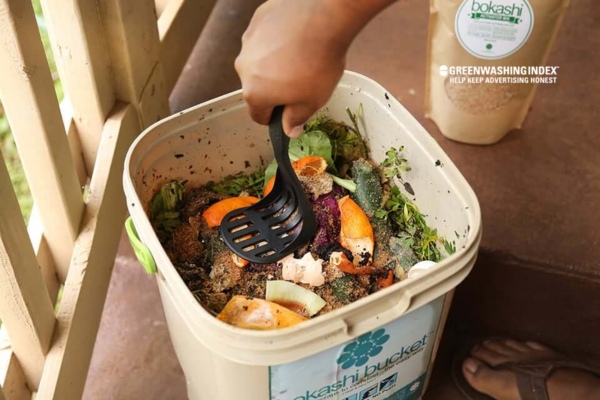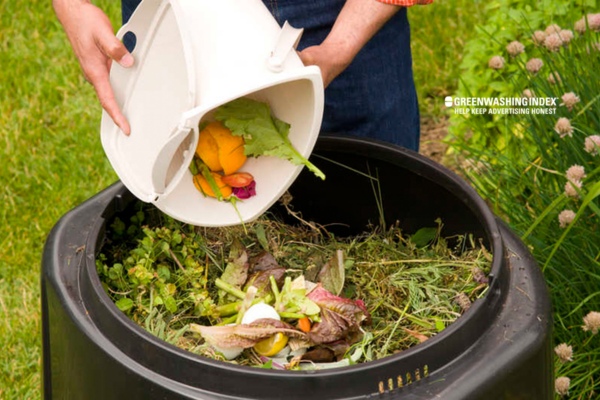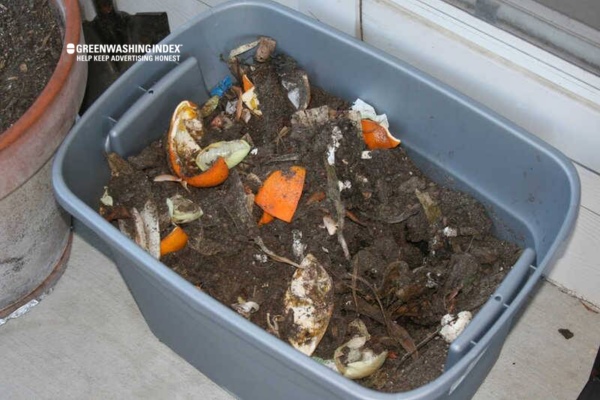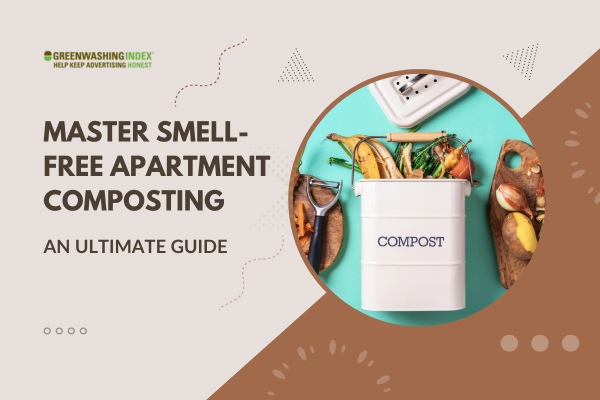Living in an apartment shouldn’t hold you back from doing your part in sustainable waste management. You might be wondering, can composting work in a small environment? Is it feasible to create nutrient-rich soil while avoiding the pungent smells often associated with decomposition? Welcome to smell-free apartment composting – a game-changer for eco-conscious urban dwellers.
Yes, you heard it right! Apartment composting without the smelly problem isn’t only possible but quite achievable. All you need is to know what goes into and what stays out of your compost bin, maintain the right balance, and choose your compost set-up wisely. Breathe easy with green living as we delve into odor-free compost tips rest assured you’ll reap rich rewards.
Here’s what’s in store for you:
- Noteworthy reasons why practicing apartment composting is non-negotiable
- A step-by-step guide on how to start smell-free apartment composting
- Expert advice on managing common challenges with indoor bins
- Innovative solutions for lack of outdoor space
- An intriguing exploration of vermiculture as a method for odorless decomposition
Understanding the Importance of Composting in Apartments
Recognizing the significance of composting in apartments promotes sustainable waste management, fostering environmental responsibility and contributing to the reduction of landfill waste.
In this day and age, observing sustainable living practices is more than just a fad – it has become a necessity. You might wonder – why composting is non-negotiable? On a grand scale, let me explain.
- Environmental Impact of Waste: Every item we throw away contributes to the massive heaps of waste that end up in landfills around the world. These dumps emit harmful gases like methane, exacerbating global warming.
- Resource Conservation: More than half of what we dispose of can be composted. With apartment composting, we convert waste into nutrient-rich soil instead of letting it rot in landfills.
- Toxicity Reduction: Plastic bags and synthetic materials decay into microplastics that leach into groundwater, contaminating human and animal food sources. When we compost biodegradable materials at home, we reduce this pollution.
Just by simply adopting odor-free composting in our apartments, we’re making a significant contribution to improving environmental health.
How Apartment Composting Can Make a Difference?
If you’re living in an apartment and thinking how much difference can I make? You’d be surprised! Here are a few ways how:
- Reduce Landfill Waste: It’s astounding but true; about 40% of household waste could be composted instead of being sent to landfills. Imagine what would happen if every apartment dweller started smell-free apartment composting!
- Lower Carbon Footprint: When waste decomposes in landfills without air (anaerobically), it releases methane—a potent greenhouse gas. By contrast, aerated or worm-assisted (vermiculture) home-composting systems break down organic matter without triggering methane production.
- Richer Soil for House Plants or Community Gardens: The end product from your eco-friendly waste management practice—compost—is a natural fertilizer that enriches the soil. It’s great for personal indoor plants or for contributing to community gardens in the neighborhood.
A Comprehensive Guide to Smell-free Apartment Composting
As an apartment dweller, it might seem impossible to engage in composting due to the limited space and of course, the dreaded smell. But with a few tips and tricks, smell-free apartment composting can become a surprisingly hassle-free aspect of your daily life.

Let’s dive right into understanding just what goes in and what stays out of your compost bin, followed by choosing the right setup for your apartment.
What You Can and Cannot Compost?
The first step towards successful apartment composting is understanding which waste materials you can compost, and which ones you need to exclude. The balance lies in ensuring that the “greens” (high nitrogen) and “browns” (high carbon) are appropriately layered in the compost bin.
Can Compost:
- Leftover vegetable and fruit scraps
- Coffee grounds and filters
- Tea bags(without plastic)
- Yard trimmings that have not been chemically treated
- Shredded newspaper or cardboard
- Eggshells
- Hair
Cannot Compost:
- Meat or fish bones and scraps
- Pet wastes
- Diseased plant materials
- Dairy products
Remember, items that take longer to decompose can create a foul smell in your home; thus, excluding them leads us one step closer to odor-free composting.
Choosing Your Apartment Compost Setup
Now that we know what goes into our bins, let’s talk about where it all will be happening – The Compost Setup.
Several options cater specifically to indoor settings like apartments; here’s looking at some:
1. Indoor Bins: Compact yet efficient, indoor bins are an excellent choice for those keen on odorless decomposition. You can either buy ready-made containers with added features like charcoal filters (to combat smell) or make one yourself using simple materials available at home.
2. Vermiculture Bins: If a little wriggle doesn’t disgust you, introducing worms (red wigglers, to be specific) to your compost setup could be the fast-track solution to apartment composting. The worms feast on the organic waste and poop out nutrient-rich compost – all while keeping smell and pests at bay.
How to Start Smell-free Apartment Composting?
Beginning the journey of apartment composting can be quite daunting, particularly when you’re concerned about potential odor problems. But rest assured, smell-free apartment composting is achievable. Here are two critical steps to get you started on this sustainable path without getting a noseful of foul odors.
Correctly Layering Your Bin for Effective Decomposition
Our first stop on this eco-friendly journey is understanding how to layer your compost bin correctly. This step guarantees that the decomposition process happens efficiently and without causing any unpleasant smells.
- Greens: These are your kitchen scraps typically comprising fruits, vegetables, coffee grounds, tea bags without the staple or paper tag (making sure they’re unbleached), and eggshells. Greens add necessary nitrogen to your compost pile.
- Browns: Browns come in as dry leaves, twigs, paper napkins (unbleached or dye-free), cardboard, and any non-glossy paper products. These will primarily provide carbon.
- Microbes: Often overlooked but crucial for decomposition are microbes which can come from finished compost or garden soil.
The golden ratio here would be 1:2 – one part green for every two parts brown by volume not weight! It’s an art really because the actual ratio fluctuates as different materials have varying amounts of carbon and nitrogen.
Layering it Right
Start with a layer of browns at the bottom; then add a layer of greens followed by a thin covering of soil or completed compost rich in microbes that speed up the decomposition process – acting like an activator for your pile!
Follow this up with another round of browns then greens until your bin is about three-quarters full. Always end with a layer of browns which acts as a bio-filter and reduces potential odors.
Balancing Parameters for Odorless Decomposition
After nailing down the layering, we need to understand the parameters that influence composting. These factors ensure the pile decomposes without creating a stinky mess.
- Moisture: Composts need water to enable decomposition, but too much could make your pile soggy and cause foul smells. We’re aiming for damp but not dripping wet here.
- Air Circulation: A good compost needs oxygen, as anaerobic conditions (lack of oxygen) can slow down composting and cause unpleasant odors. This is why regular turning or aeration of your compost pile is important.
- Temperature: Compost piles heat up as decomposition happens – it’s completely natural! However extreme temperatures, either too hot or cold, may hinder the process. Ideally, your apartment compost bin should be located in a place where temperatures are fairly stable.
The Secret Sauce to Odorless Apartment Composting
Navigating the secrets behind a smell-free composting routine within an apartment can seem like a daunting task at first, but don’t worry! I’m here to reveal just that.

Activated Charcoal Filters And Their Role in Odor Absorption
If you’re aiming for odor-free composting, activated charcoal filters could be your best ally. These filters might look unassuming, but they’re packed with power when it comes to absorbing those stinky odors from your compost bin. Let me explain how.
Activated charcoal, or as some people call it ‘activated carbon,’ isn’t your everyday barbecue charcoal. It’s a specifically treated form of carbon known for its incredibly porous surface. This structure results in superior absorbency.
- The micro-pores trap odorous substances and pollutants and eliminate them from the air.
- They work splendidly on a variety of organic compounds infamous for causing terrible smells – hydrogen sulfide, ammonia, etc.
- You can dispose of these activated charcoals after saturated use and add them directly into your compost pile!
Implementing this magical component into our smell-free apartment composting mission will significantly reduce any offending smells that might have deterred us before.
Worms – Nature’s Best Recyclers! Discuss Vermiculture As A Method For Smell-Free Composting.
Yes! You got it right; our little wriggly friends – worms! Particularly Red Wigglers (Eisenia fetida), who are phenomenal recyclers and crucial players in the arena of odor-free apartment composting. Let’s see why:
- Nutrient-rich castings: Red Wigglers digest our kitchen waste and excrete nutrient-rich castings (worm poop). These castings are an exceptional soil additive instrumental for plant growth!
- Speedy processing speed: Trust me; these guys eat garbage fast – about half of their body weight each day in organic waste!
- Odor and pest control: The method is practically odor-free because worms consume the waste so quickly that it doesn’t have time to rot and smell.
- Thrives Indoor: These creatures can live happily in indoor bins, making them perfect for apartment composting.
- Easy breeding: Once you’ve got a squad of red wigglers, they’ll reproduce quickly if conditions are right, giving you a steady population for ongoing composting. Pay attention to keep a balanced environment (not too dry or overly wet) within your vermicomposting bin.
Investing in these nature’s workaholics would pay you rewards by transforming your kitchen waste into precious garden gold- all while ensuring Smell-free Apartment composting!
Embracing these two secret ingredients – Activated charcoal filters and Red Wigglers, the challenges of keeping an odor-controlled indoor compost bin become negligible! So folks, let’s add a bit more green to our lives with eco-friendly apartment living.
Troubleshooting Common Issues In Smell-Free Apartment Composting
Regardless of the method used, composting in your apartment can present various challenges. Here are solutions to some common issues you might face.

Working Around Lack of Outdoor Space
Limited outdoor space is a common problem in apartment composting. But don’t let that deter you as indoor composting is very much achievable and doesn’t have to be inconvenient.
- Compact Bins: Use compact bins designed specifically for indoor use. They are easy to tuck under the kitchen sink or on a balcony — out of sight yet easily reachable for everyday use. Choose bins designed for smell-free apartment composting, with built-in odor control features.
- Vermiculture Bins: You could also opt for vermiculture bins – essentially worm farms that convert organic waste into nutrient-rich worm castings and “worm tea.” Despite their wriggly inhabitants, these composters can fit snugly into small spaces and produce no foul odors when well managed!
It’s all about finding solutions that suit your living arrangement, whether it be tight corridors or shared living spaces.
Managing Common Challenges with Indoor Bins
Honestly, smell-free apartment composting isn’t devoid of its share of hiccups. Unpleasant smells and pesky pests can sometimes play spoilers.
Here’s how you can tackle these issues:
- Regular Aeration: Ensure good air circulation by turning over the mixture in your bin every few days using a small shovel or garden fork.
- Balance Between Green and Brown Material: Keep a balanced mix of ‘greens’ (fruit/veg scraps) high in nitrogen and ‘browns’ (dry leaves/newspaper) rich in carbon to help expedite decomposition while keeping foul smells at bay.
Always remember: healthy compost shouldn’t stink but possess an earthy aroma!
Dealing With Fruit Flies Or Other Pests
Pests, especially fruit flies, can be a headache when apartment composting. However, there are tried and true methods for keeping these unwelcome guests at bay:
- Fruit Fly Traps – Put up a homemade or store-bought trap near your compost bin to lure and capture any nearby fruit flies.
- Use of Tightly Sealed Bins – Invest in a tightly sealable compost bin to prevent pests from accessing your organic waste.
- Proper Compost Management: Regularly turning the pile, maintaining appropriate moisture levels, and properly balancing greens & browns can also work wonders in preventing infestations.
FAQs
Is smell always a problem when you compost?
No, not at all. With the right balance of greens and browns, proper aeration, and moisture balance, composting can be a relatively smell-free process. Smell-free apartment composting is achievable with some careful steps.
What can I do if my apartment compost bin starts smelling?
If your apartment compost bin starts to emit odors, it may be time to troubleshoot. It could indicate an imbalance between greens and browns or insufficient aeration. Try stirring the bin more often or adding more brown materials like dried leaves or shredded newspaper.
Can I compost anything from my kitchen?
While many kitchen scraps are great for your eco-friendly waste management system, some aren’t suitable for apartment composting. Meat scraps, dairy products, and any foods cooked in oil should be avoided as they have tendencies to attract pests and produce smelly odors.
What to do with finished compost in an apartment setting?
Finished compost in an apartment setting can be used in different ways even without a backyard garden. You can use it for indoor plants or donate it to community gardens. Another idea is selling it – many local gardeners will appreciate high-quality homemade compost!
Conclusion
Lastly, I encourage you to take the plunge and begin your taste of sustainable living in your apartment through composting. Doubtlessly, it will require a bit of effort and commitment, but trust me, the long-term benefits to our planet are far too significant to overlook.
By adopting odor-free composting techniques, we can all do our part – even in small ways – towards an eco-friendly lifestyle. Additionally, apartment composting will provide you with rich organic inputs for your indoor plants or community garden, creating a circle of life right within the comfort of your apartment.
Key Takeaway Points
- Apartment composting is an essential strategy for sustainable living in apartments.
- A variety of apartments suitable composter options exist, ranging from indoor bins to worm bins.
- Adopting correct practices such as layering and maintaining balance in parameters ensures smell-free compost.
- Activated charcoal filters play a crucial role in odor absorption, while worms serve as excellent recyclers.
- Anticipating common challenges and knowing how to navigate them guarantees success in smell-free apartment composting.



